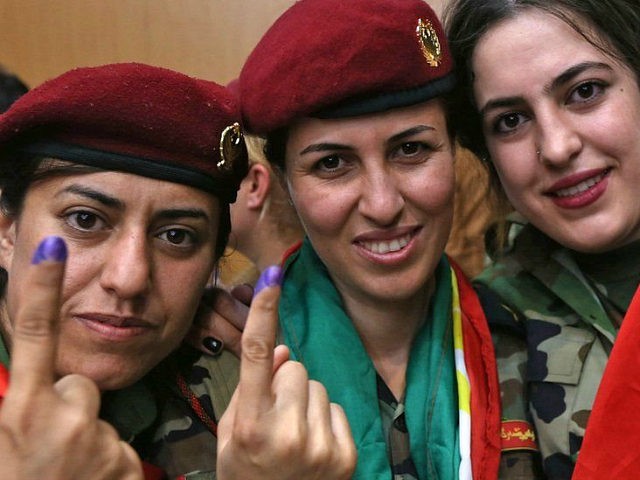The majority of Iraqi Kurdistan’s population voted “yes” to independence, a move that has provoked Iran and Turkey to threaten military action in retaliation.
Northern Iraq’s autonomous Kurdistan region held the vote on Monday, angering neighboring Iran and Turkey and defying objections from the United States and the Shiite-led Baghdad government.
“The referendum does not mean independence will happen tomorrow, nor are we redrawing borders,” Kurdistan Regional Government (KRG) Prime Minister Nechirvan Barzani said Monday. “If the ‘yes’ vote wins, we will resolve our issues with Baghdad peacefully.”
The independence referendum had long been expected to pass.
Neighboring countries, including Syria, oppose Iraqi Kurdistan’s wishes to become a sovereign nation, fearing that it will fuel separatism among the Kurdish population within their borders.
On Monday, the New York Times (NYT) reported:
Despite the celebrations, the vote may come at a steep political cost to the Kurds.
It proved highly provocative for Turkey, Iran, and Iraq, whose responses are likely to roil the region in the coming days, stirring the very turmoil that the United States hoped to avoid when it pressured the Kurds to call off the vote.
Widely feared risks of “unrest” expressed by the United States and the neighboring countries failed to materialize during the referendum, reported the Associated Press (AP), noting that “the vote was held peacefully.”
On Tuesday, Kurdistan Regional Government (KRG) President Masoud Barzani revealed that Kurds had voted “yes” to independence, a move considered a “historic step in a generations-old quest for a state of their own,” notes Reuters.
NYT noted on the day of the vote:
As jubilant Iraqi Kurds celebrated their vote Monday on independence from Iraq, shooting off fireworks and parading in cars festooned with Kurdish flags late into the night, their neighbors conducted military exercises on the region’s borders, raising the threat of military intervention if it secedes.
…
Turkey and Iran, which fear that the vote will foment unrest among their own Kurdish minorities, are conducting military exercises on their borders with Iraq near Kurdistan. Late Monday, Iraq’s defense ministry announced joint maneuvers with Turkey.
In Iran, home to a significant Kurdish minority, thousands of Kurds took to the streets to march in support of their neighbor’s independence efforts, disobeying the wishes of Tehran which flew warplanes over their areas, points out Reuters.
Furthermore, Iran-allied Shiite militias in Iraq, sanctioned by Baghdad, have threatened to march on Kurdish-held Kirkuk in response to the referendum.
“We as Popular Mobilization would be fully prepared to carry out orders from Abadi if he asks to liberate Kirkuk and the oilfields from the separatist militias,” said Hashim al-Mouasawi, a spokesman for the al-Nujabaa paramilitary group, a component of the Popular Mobilization Units (PMU).
Prior to the vote, tensions intensified between Kurdish forces and PMU troops, also known as the Popular Mobilization Forces (PMF) and Hashd al-Shaabi.
“Iran banned flights to and from Kurdistan on Sunday, while Baghdad asked foreign countries to stop oil trading with the Kurdish region and demanded that the KRG hand over control of its international airports and border posts with Iran, Turkey, and Syria,” also reports Reuters.
Iranian Maj. Gen. Yahya Rahim Safavi, a top adviser to the Shiite country’s Supreme Leader, urged “the four neighboring countries to block land borders” with the Iraqi Kurdish region, notes Reuters, citing the state-controlled Islamic Republic News Agency (IRNA).
Tehran maintains influence over the Shiite-led government in neighboring Iraq.
Meanwhile, Turkey, which has long fought Kurdish separatist groups within its borders, “reiterated threats of economic and military retaliation,” points out Reuters.
On Monday, Turkish President Recep Tayyip Erdogan warned that his country might take military action and threatened to shut down a pipeline that links Turkey to Iraqi Kurdistan, carrying oil from northern Iraq to the outside world.
“After this, let’s see through which channels the northern Iraqi regional government will send its oil, or where it will sell it,” said Erdogan. “We have the tap. The moment we close the tap, then it’s done.”
Moreover, the Baghdad-based defense ministry revealed that the Iraqi and Turkish armies had started “major maneuvers” on their mutual border.
KRG Prime Minister Barzani has reportedly indicated that the Iraqi Kurdistan region hopes to maintain good relations with Turkey.
Although U.S. President Donald Trump’s administration stressed that it was “deeply disappointed” by the KRG’s decision to conduct the referendum, it noted that the move would not change the America’s “historic relationship” with Iraqi Kurdistan.
“We hope for a unified Iraq to annihilate ISIS [Islamic State] and certainly a unified Iraq to push back on Iran,” said White House spokeswoman Sarah Sanders, referring to the vote.

COMMENTS
Please let us know if you're having issues with commenting.